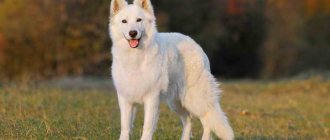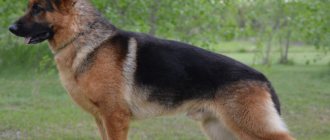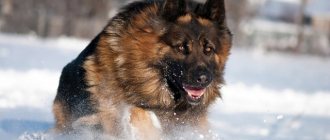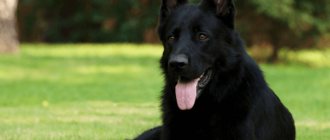In order for your shepherd and children to quickly find a common language, you need to understand how to properly build a relationship with your pet.
It is very useful for children to grow up in the same house with a dog: they will learn to communicate with other living beings with respect, and will become more responsible and disciplined.
Breed Features
One of the most easily recognized and popular breeds, it is loved throughout the world for its intelligence, working qualities, versatility and loyalty. They are ready to put themselves in danger to protect their owners, including the youngest members of the family; very smart, easily learn many tricks and commands, get along well with other animals.
These characteristics make them an ideal family pet, but potential owners should be aware that this breed is slow to mature and requires daily exercise and frequent companionship.
- If owners take into account the breed's temperamental characteristics listed below, the German Shepherd and children will build a strong friendship.
Description of character
The German Shepherd is a full-fledged “service dog”, completely human-oriented, tireless and fearless. Increased vigilance makes it an excellent watchman or security guard.
The ancestors of the breed are shepherds, which left an imprint on the behavior of the shepherd, she loves to “count” and collect everyone, this applies to both domestic animals and people, because they make good nannies for children. To raise a worthy pet, you need to make an effort, especially if the German lives in a large family.
If you brought a small puppy into your home, then you need to introduce the baby to children gradually, limiting their communication until he is completely comfortable. As they grow older, full socialization and training is required, this will help raise an excellent companion you can rely on.
German Shepherd Health and Diseases
Germans are strong and hardy animals and their average life span is from 10 to 14 years.
But purebred German shepherds cannot boast of excellent health. Dogs have quite sensitive digestion and often suffer from indigestion and food allergies. Germans are prone to ear diseases (otitis media, ear mites) and may have vision problems (cataracts, corneal dystrophy).
Shepherds are also susceptible to a number of genetic diseases, such as:
- epilepsy;
- hip dysplasia;
- diabetes;
- cardiovascular diseases;
- tumors;
- degenerative myelopathy (paralysis);
- disturbances in the hormonal system.
The average lifespan of a German Shepherd is 9-13 years.
Difficulties in forming the breed and forced inbreeding have led to a number of serious diseases. Some appear in puppyhood: growth hormone deficiency, diabetes, leukemia, eosinophilic panostitis (intermittent claudication), intussusception, pyoderma (purulent skin lesions).
Later, allergies, hip dysplasia, intervertebral disc diseases, arthritis, corneal dystrophy, epilepsy, cataracts, pancreatic insufficiency, dysplasia of the tricuspid or mitral heart valve, aortic stenosis (narrowing of the opening of the vessel), exudative pericarditis (inflammation of the outer membranes of the heart) may appear. , cancer, hind limb paralysis.
Under the influence of external factors, ear and eye infections, dermatitis, volvulus, bloating and others can begin.
At the first signs of poor health, you should contact a veterinary clinic, where they can make a correct diagnosis and begin treatment. In addition, it is important to see your veterinarian regularly for routine check-ups - especially for puppies in active growth and dogs over 7 years of age.
German character towards children
Germans are often cold towards strangers, but are very affectionate and affectionate towards all family members, regardless of their age, making them a reliable guardian for young children.
Patience is also an admirable quality: when small children pull their tail or pull their fur, the German will most likely not get upset. If excessive attention annoys him, he will simply leave or hide.
A sharp mind helps a dog learn quickly - owners can raise it to be a well-mannered, gentle animal towards both their own and other people's children. The option when a German shepherd and a child grow up in the house together is preferable, but you should weigh your strengths in advance.
- Keeping Germans in a house where there are small children has its own nuances. They grow to a large size and, when played out, can accidentally crush the baby or injure him. Puppies are especially clumsy and don't understand their size.
The breed has a strong herding instinct and will often nip or gently nip animals or people, thereby encouraging them to move. This is not aggression, but for children who, due to their age, cannot cope with such behavior, it is dangerous.
When choosing the gender of a puppy, you should know that females, as a rule, get along better with younger family members. Males can be dominant if they are not properly trained.
Physical activity
Max von Stephanitz in his book provided a complete description of the German Shepherd, whose appearance is characterized by a muscular body structure. Dogs are characterized by large, erect, pointed ears, a powerful bite, and a fluffy tail. During physical activity, dogs quickly cover long distances thanks to their wide strides. Regarding the appearance of the color scheme, black and brown shades of wool predominate; there are varieties of combinations of these colors.
You can find a dog with a solid black color
Shepherd and children under 3 years old
This is the most difficult period in the formation of the “dog-little owner” relationship. German Shepherds and infants and children under 7-9 years of age should always communicate only under adult supervision!
If you consider the option of bringing a baby into a family where an adult shepherd dog already lives, you should pay attention to possible difficulties.
Infants cry, scream, move their arms and legs a lot and incomprehensibly (from the pet’s point of view), and make sudden piercing sounds. If an adult dog has had little experience with children, it may become frightened, agitated, and even aggressive. Because for a not very socialized animal, the behavior and cries of a child are simply terrible.
The solution to the situation will be immediate and comprehensive communication between the adult dog and children. Accustom her to all such situations and noises under supervision, make it clear through your example that all this is absolutely normal, nothing scary or exciting is happening.
- Pay special attention to cleanliness in the house: do wet cleaning regularly, do not allow dead fur to fly in the air, as this may cause breathing problems and/or allergies in the child; Do not allow the dog into the room where the newborn is in the first weeks of his life.
Try to maintain discipline in the house: you can ask your German to leave the room when the baby is sleeping or eating. Likewise, as your baby learns to crawl, keep him away from your dog's food bowls and resting areas.
Train yourself to keep all diapers, baby care products and toys in a confined space, out of your dog's reach. This is necessary because the shepherd is usually curious about these objects, since they have a strong smell, there is a danger that he will chew or swallow them.
Nuances of keeping and caring for a German Shepherd
The structural features of the coat allow the German Shepherd to live both indoors and in the yard. In the second case, a spacious enclosure with an insulated booth is needed. In addition, it is advisable to at least partially protect the enclosure from precipitation and wind.
German Shepherd having a meal
Immediately after the dog appears in the house, determine for it its own place where there will be bedding, a mattress, and toys. There should be no direct sources of heat or drafts in its immediate vicinity. Natural materials that do not require complicated cleaning are preferred for the bed.
The main aspect of proper maintenance of any dog is a balanced diet, which will ensure normal development and good health for life. The easiest way to guarantee a complete diet is ready-made premium and super-premium food for the appropriate age category, and for adult animals - taking into account special needs.
With a “natural” diet, it is important to follow the ratio of protein products and fiber recommended by veterinarians. And, of course, you cannot feed your shepherd dog scraps from the human table, because its digestive system is not ready to work with fatty, fried, salty foods and spices. Fresh water must be available at all times.
When soiled (but not too often), it is necessary to bathe the dog in warm water with special shampoos. Brushing is carried out once or twice a week; during seasonal molting, the procedure must be done more often. The condition of the ears, eyes, mouth, and nasal passages should be regularly monitored.
It is recommended to visit the veterinarian for a preventive examination at least 2-3 times a year.
When deciding to get a German, be prepared for the fact that you will have to devote a lot of time and attention to your pet. Dogs need daily walks and regular exercise. Animal hair that is thick and prone to matting requires careful care. Finally, the owner must take care of the German Shepherd's proper and balanced diet.
Unpretentious Germans easily adapt to any living conditions. Therefore, the dog can be kept both in an apartment and in a private house. Naturally, a pet will be more comfortable in a house with a vast territory, where he can run and frolic to his heart's content.
But even in a small apartment, the dog will feel comfortable, provided that you provide him with the physical activity he needs and long walks.
If a German is kept in the yard, a spacious enclosure with an insulated booth will be equipped for him.
- The main disadvantage of the German breed is that the dogs shed heavily all year round. Also, their fur gets tangled and rolls into tangles, which spoils the appearance of the pet. Therefore, the dog needs to be combed once every 2-3 days, and during the period of intense shedding (beginning of spring and autumn), the combing procedure is carried out daily;
- Germans are bathed no more than 2-3 times a year, using a special shampoo for large, wire-haired breeds of dogs;
- periodically inspect the pet's ears and remove dirt with a cotton swab (not a swab). The eyes are also regularly cleaned of discharge using a damp cotton pad;
- if the dog lives in an apartment, his nails are trimmed 1-2 times a month. When kept outdoors, dogs' claws grind down on their own, and such a procedure is not necessary;
- To remove plaque and prevent the formation of tartar, animals' teeth are brushed several times a week.
Preschool age and dog
You must help your children become an accepted, full member of the “pack” in the eyes of your German Shepherd – the way she treats you is the way she should treat them.
Each child should regularly participate in feeding; it is even better if each family member takes turns feeding the pet.
Start involving children from 4.5 years old in shepherd training - take this seriously, this will form the right relationship between the little owner and the dog. Explain how to behave correctly with an animal - do not hurt, do not frighten, do not look closely into the eyes, do not get into the bowl when feeding, show how to play correctly. Be sure to teach him to put toys in place so that the dog cannot reach them.
- Raising a puppy with small children requires a lot of patience and effort on the part of the parents. Often a fast growing dog will use his teeth in play, sometimes leaving scratches.
Children will nullify all the work done by the parent in raising the puppy, because the little person is not yet able to be either firm or consistent with the puppy. If parents understand how much patience they will need, a German Shepherd puppy can grow up side by side with children and be a source of joy for everyone.
Very important! Never leave small children alone with your German Shepherd. This is the best rule that can save you from any accident.
Basics of raising a German Shepherd
German Shepherd with a child
The owner should demonstrate his authority without resorting to shouting and, especially, physical force. If it seems to you that there are significant deviations in the puppy’s behavior that you cannot cope with yourself, be sure to seek help from a canine specialist.
Of course, not every German Shepherd becomes a service dog and maintains order in special units. But even a pet needs to understand and respond adequately to basic commands: “Come to me!”, “Place!”, “You can’t!”, “Nearby!”, “Sit!”, “Lie down!”, “Walk!”, “ Aport!
We suggest you read: After birth, discharge in cats. Blood in a cat after childbirth: norm and pathology, how to distinguish
When the puppy’s bones are strong enough, you can begin to overcome obstacles (be sure to take into account the height and capabilities of the pet). The most important point is to teach the dog to walk on a leash, and from six months - in a muzzle. It’s better to do this gradually and don’t forget about tasty rewards for obedience.
It is important to remember that German Shepherds reach psychological maturity quite late, by the age of three. A young dog, whose dimensions fully correspond to the breed standard, internally remains a vulnerable puppy, requiring care and approval.
German and teenager
Teenagers can already fully care for a shepherd. This will teach the little owner responsibility and discipline, help him understand dog psychology more deeply, and the German will be much more willing to obey the younger family member.
- In principle, young shepherd owners are usually perceived as adults, so problems of disobedience or disrespect are extremely rare.











